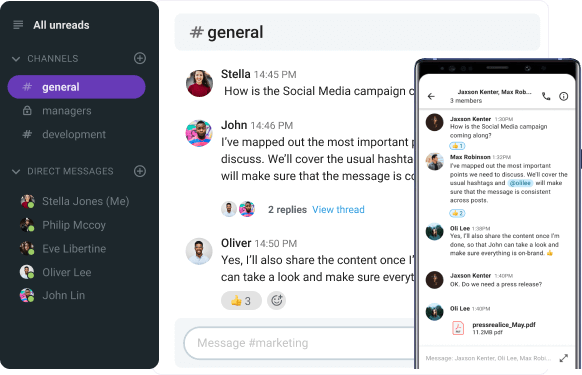Lately, emotional intelligence (otherwise known as emotional quotient or EQ) has been gaining in popularity — especially in the workplace, where it’s becoming more and more relevant.
A hybrid literature review on emotional leadership published in 2023, titled Emotional intelligence, leadership, and work teams, proved there’s a correlation between the emotional intelligence of leaders and employee behavior and business results. Namely, emotionally intelligent leaders are more likely to build relationships with their employees that inspire positive attitudes towards work, which later reflects in business results.
So, one can say that, in the workplace, EQ matters more than IQ.
That’s why today, we’re going over the basics of emotional intelligence and answering the questions:
- What is emotional intelligence and why is it important in the workplace?
- What are the main components or aspects of emotional intelligence?
- How can we improve emotional intelligence?
Let’s get started!

- Emotional intelligence is the ability to identify, understand, and manage our own feelings as well as those of others.
- Emotional intelligence or EQ in the workplace is reflected in our capability to understand other people’s points of view or emotions when they don’t necessarily coincide with our own.
- There are 5 components of emotional intelligence: self-awareness, self-regulation, motivation, empathy, and social skills.
- EQ is vital in the workplace because it:
- Improves teamwork,
- Improves career prospects,
- Reduces stress,
- Increases accountability,
- Improves the workplace environment,
- Improves motivation and engagement, and
- Builds effective communication.
Table of Contents
What is emotional intelligence?
Emotional intelligence is the ability to identify, understand, and manage our own feelings as well as those of others.
The term, first coined by Peter Salovey and John D. Mayer, was introduced in 1990 and has since become a commonplace phrase.
In his book Emotional Intelligence: Why It Can Matter More Than IQ, Daniel Goleman defines emotional intelligence as “the capacity for recognizing our own feelings and those of others, for motivating ourselves, and for managing emotions well in ourselves and our relationships.”
Importance of emotional intelligence in the workplace
Emotional intelligence or EQ at the workplace is reflected in our capability to understand other people’s points of view or emotions when they don’t necessarily coincide with our own.
EQ is crucial for our ability to maintain effective interpersonal communication in the workplace, which also means it can severely impact our overall performance.
In fact, it’s so vital that Goleman considers it a “critical predictor of success in life”.
Overall, people with high levels of emotional intelligence in the workplace:
- Are more motivated and inspired,
- Can think more laterally, thus making better decisions,
- Can recognize various opportunities for growth,
- Are more capable of recognizing and resolving conflicts, and
- Are generally more satisfied with their job.
Emotional intelligence is a skill equally important for employees and leaders because it:
- Improves teamwork,
- Improves career prospects,
- Reduces stress,
- Increases accountability,
- Improves the workplace environment,
- Improves motivation and engagement, and
- Builds effective communication.
To give you a better idea of why you should work on your own emotional intelligence, we’ll take a more detailed look at each of these points and further explain how they correlate to emotional intelligence.
Emotional intelligence and teamwork
More emotionally intelligent employees work better in a team because they are:
- Better communicators,
- More open to their coworkers’ ideas, and
- Less likely to take complete control over a project.
Emotionally intelligent employees are considerate and communicate respectfully with others.
What’s more, emotional intelligence enables them to build trusting relationships with their coworkers, which further improves their teamwork.
One of our contributors, Kathryn Boudreau, a Remote Operation Manager at Spread Great Ideas, shared with us her opinion on how emotional intelligence correlates to teamwork:

“Emotional intelligence builds self-awareness and helps you better relate to others at work, leading to better communication. It helps build better self-regulation and interpersonal relationships, allowing teams to work towards organizational goals regardless of the challenges.”
In other words, self-regulation, a component of emotional intelligence, improves your workflow with your team.
Emotional intelligence and career prospects
The qualities of effective leaders correlate with high emotional intelligence. Great leaders are:
- Patient,
- Active listeners,
- Resilient,
- Positive, and
- Empathetic.
Therefore, there shouldn’t be many things more important than emotional intelligence for managers and leaders.
Furthermore, if you’re wondering how emotional intelligence can help you if you’re neither a manager nor a leader, research on emotional intelligence says — quite a lot. Having high EQ enables you to build closer working relationships and understand your role in the team and the company, which increases your chances of promotions and raises.
Emotional intelligence reduces stress
According to the research Emotional Intelligence and Stress Coping: An Organizational Perspective, self-motivation and emotional health can greatly contribute to the effectiveness of coping with stress.
People with high EQ are more likely to be able to manage and regulate their own emotions in stressful situations, thus mitigating the negative effects of stress.
Instead of succumbing to pressure during stressful times, these employees show emotional self-control and resiliency.
Thanks to those qualities, they overcome professional obstacles with more confidence and ease than those with lower EQ scores.
Our contributor Cheryl Brown Merriwether, Senior Professional in Human Resources and Vice President of the International Center for Addiction and Recovery Education (ICARE), observed something similar over the course of her career:

“The workplace has always been a high-stress environment. Individuals differ in their abilities to cope with stress. Some choose unhealthy methods that lead to struggles with mental health, substance misuse, or other behavioral health issues.
Emotional intelligence benefits individuals by providing them with skills needed to improve working relationships and develop higher levels of resilience in response to change, and increasing self-awareness and greater self-control.”
Emotional intelligence and accountability
Theodore Roosevelt once said:
“The only man who never makes a mistake is the man who never does anything.”
— Theodore Roosevelt
So, if you work, you’re bound to make some mistakes.
The mistakes you make don’t define you — but how you deal with them is what makes a difference in how you’re perceived in the workplace.
Managers and employees with higher emotional intelligence are more likely to promote accountability and constructive feedback.
In other words, they often own up to their mistakes and seek help to correct them. Thanks to higher levels of self-awareness, they are unlikely to pass the blame on others or get defensive.
Emotional intelligence and the workplace environment
For a workplace environment to be an area of enjoyment, employees should respect one another and get along with one another.
Emotionally intelligent employees help reduce stress and boost morale in the workplace, making a healthy company culture — something our contributor Merriweather highlights as vital.

“In today’s stressful workplace, emotional intelligence teaches people how to constructively ‘blow off steam’ and resolve conflict, which protects the safety of the individual and others and fosters a culture of workplace wellness.”
💡 PUMBLE PRO TIP
If you need help with creating a positive work environment, we have a whole blog post on that topic — check it out:
Emotional intelligence and employee motivation and engagement
According to the 2023 study The Influence of Emotional Intelligence on Employee Engagement and Job Satisfaction, emotional intelligence in the workplace is directly related to employees’ level of enthusiasm.
Employees with high EQs can maintain effortless interpersonal communication and relationships with their coworkers, which increases overall engagement.
Aside from that, more emotionally intelligent employees are also more dedicated to their job, and dedication greatly influences a company’s bottom line. According to Pumble’s 2023 Employee engagement statistics, companies with highly engaged employees have 5 times higher profit margins than companies with disengaged employees.
💡 Pumble Pro Tip
Employee engagement is what makes or breaks a company. To learn how to ensure your employees are dedicated and thus engaged, read the following article:
Emotional intelligence and effective communication
Last but not least, emotional intelligence enables you to stay calm under pressure and be in control of your emotions, thus making your communication effective.
Emotionally intelligent employees don’t let their emotions negatively affect their communication. Instead, even when dealing with obstacles or deadlines at work, they stay calm and communicate their expectations clearly and effectively.
Additionally, emotional intelligence enables you to read the situation and restrain yourself from responding impulsively.
This diplomatic manner of communication also prevents conflicts and builds trust between colleagues — as noted by Dr. Gena Cox, an Organizational Psychologist and Founder of Feels Human, LLC:

“Emotional intelligence helps managers and colleagues understand ‘what is really happening here’ — the unspoken context that is as important as what is spoken out loud. When people lack this intelligence, they come across as lacking empathy, because they do not pick up on nonverbal cues. And they are not easily trusted.”
Finally, emotional intelligence makes you a more assertive communicator — it allows you to:
- Respectfully communicate your needs,
- Effectively present your ideas, and
- Be proactive.
💡 Pumble Pro Tip
Effective communication is essential in the workplace. To learn how you can harness the power of effective communication, read the following article:
5 Components of emotional intelligence (and how to improve them)
Now that we’ve seen how emotional intelligence can make a difference in the workplace, it’s time to take a closer look at the components of emotional intelligence to further answer the question, “What does emotional intelligence mean?”
Goleman outlines 5 elements of emotional intelligence:
- Self-awareness,
- Self-regulation,
- Motivation,
- Empathy, and
- Social skills.
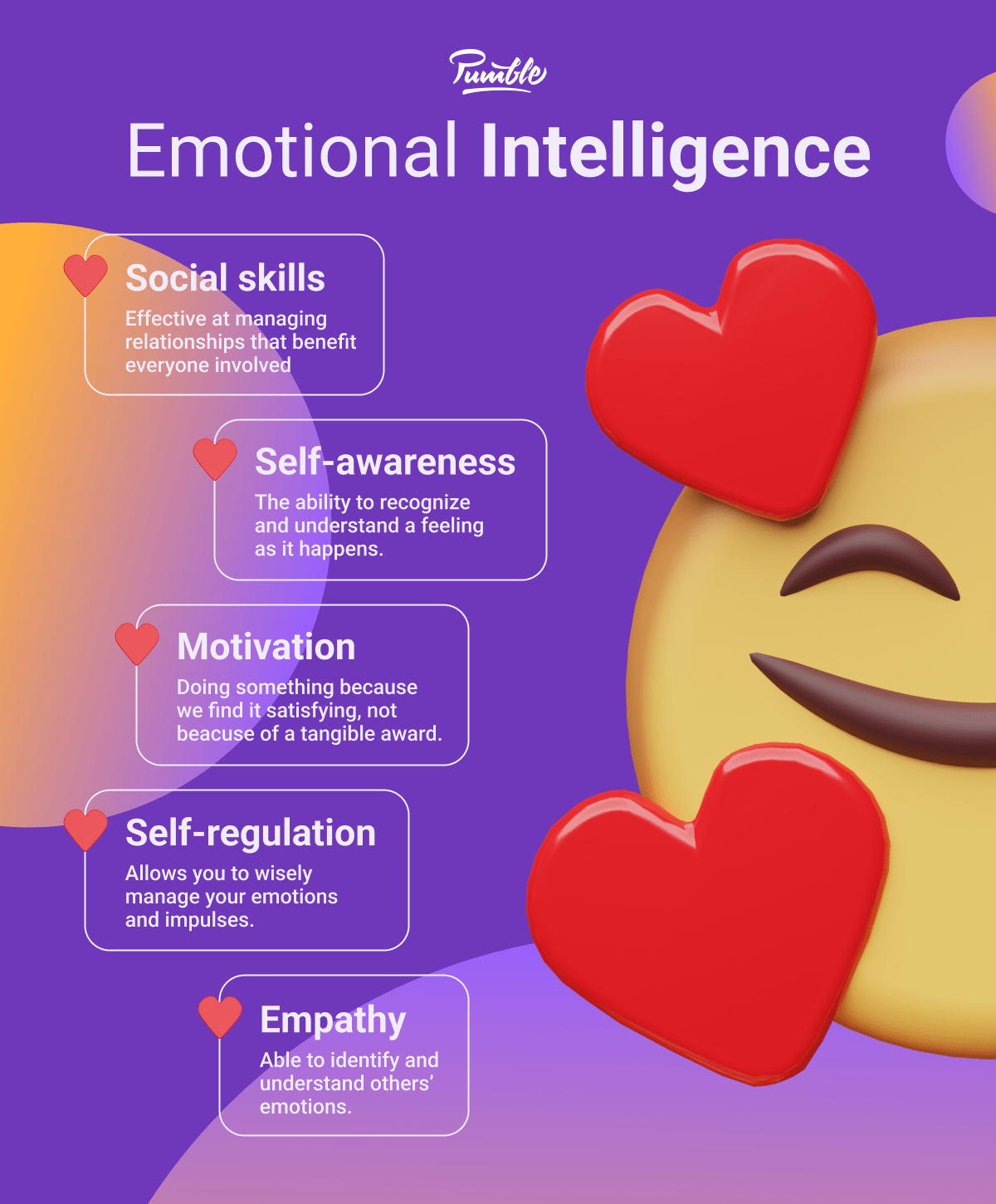
Element #1: Self-awareness
According to Goleman, self-awareness is the crucial component of emotional intelligence.
It is the ability to recognize and understand a feeling as it happens.
This element is the keystone to psychological insight and self-understanding — if we’re not able to recognize our true feelings, we’re at their mercy.
Consequently, being aware of our emotions makes us better pilots in our lives. We’re in control.
Self-awareness is something we should continuously work on, so here are the top 3 tips on how to do that in the workplace.
How to improve self-awareness
- Write down your plans and priorities
If you want to raise your self-awareness, the first thing you need to do is write down your plans and priorities for the day or the week.
This exercise will help you track your progress and see if you stick to your agenda.
Even the famous Benjamin Franklin used a somewhat similar method to increase his own self-awareness — he used to write a so-called ‘balance sheet’, in which he would list both the assets and liabilities of his personal traits.
This helped him better assess his character and identify opportunities for improvement, and it can do the same for you.
- Take psychometric tests
Psychometric tests are not reserved for HR professionals and the recruitment process.
They can be a useful tool for your journey to your better self, as they can help you better understand your true personality and see what your strengths and weaknesses are.
A plethora of psychometric tests are at your disposal — the most famous ones being:
- The Myers-Briggs Type Indicator,
- The Sixteen Personality Factor Questionnaire, and
- DISC.
These tests help you better understand your true personality, strengths, and weaknesses.
- Get regular feedback at work
According to Pumble’s 2023 Communication in the workplace statistics, 72% of employees feel they would be more productive if given regular feedback.
If done well, constructive feedback enables you to better understand your strengths and weaknesses.
This is an irreplaceable tool for continued learning and improvement.
In the example below, Judith is unsure whether her latest project was satisfactory, so she’s asking for her manager’s feedback via her company’s team collaboration software, Pumble.
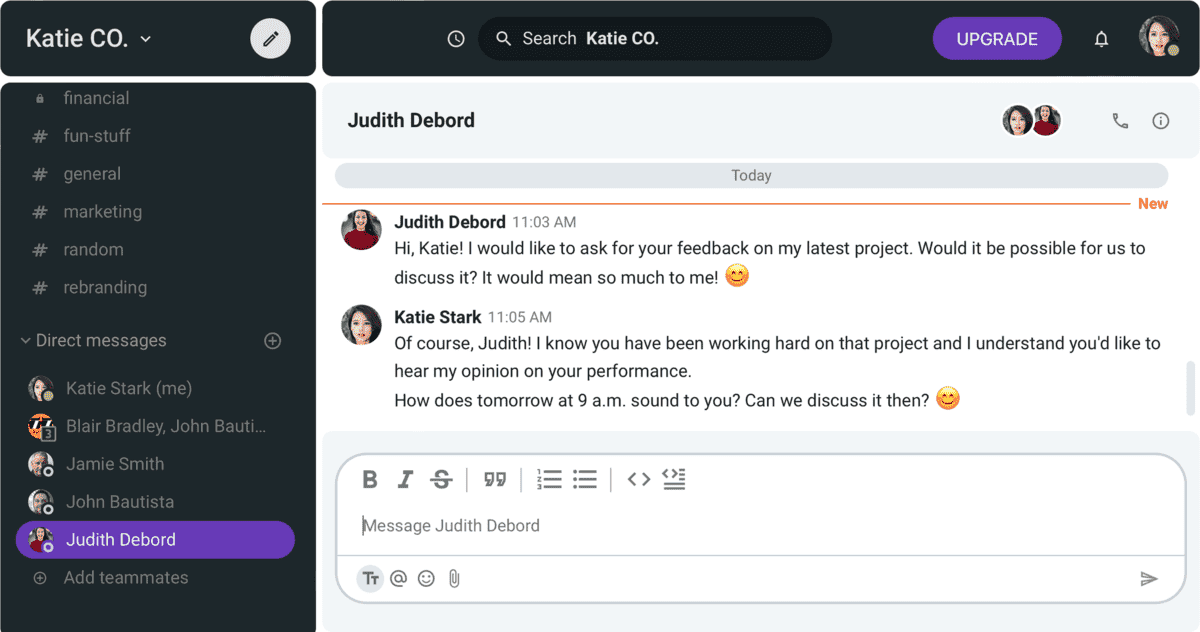
Judith is demonstrating a healthy attitude toward her insecurities.
She’s not sure she’s done what needs to be done, so she’s asking for her manager’s opinion, rather than succumbing to self-doubt.
💡 Pumble Pro Tip
Asking for feedback is often a stressful experience — but it doesn’t have to be. To learn how to properly seek out constructive feedback from your managers and leaders, read our guide:
Element #2: Self-regulation
It’s not enough to be aware of your emotions and accurately name them — you have to regulate and manage them effectively if you want to improve your emotional intelligence.
People who have trouble with the regulation of their emotions are in a constant battle with distress.
Those who are lucky and know how to self-regulate can bounce back more easily from the setbacks life throws at them.
However, it’s important to highlight that the goal here is not suppression of emotions — as they all have their value and place in our life. At the same time, you don’t want your emotions to be out of your control.
The key is to find balance. Here’s how you can do that.
How to improve self-regulation
- Respond, don’t react
When we find ourselves in a dangerous situation, our amygdala is the first to react, but it can sometimes do that severely — a phenomenon Goleman named “amygdala hijack”.
This hijack often leads to irrational and inappropriate behavior.
That is precisely why you should learn to respond (considerately and deliberately) instead of react (rashly and impulsively) to situations.
Let’s illustrate this difference with an example.
Let’s say your colleague forgot to send an important report to your most valuable client. You can now either react to that (not recommended) or respond (recommended).
| ❌ Reaction: | ✅ Response: |
|---|---|
| You lose your grip and start yelling at your colleague. Both you and your colleague are upset, and the problem is no closer to its solution. | You acknowledge that you are angry at your colleague for forgetting to send that report, but you take a deep breath and pause. Then, you consider the situation, try to make amends to your client, and talk to your colleague (who promises not to repeat the mistake). |
- Understand that many things are out of your control
Accept that you cannot control everything.
This acceptance is not the same as resignation or passivity — it simply means that we need to analyze the situation objectively and be real about what we can and cannot control.
What you can do, though, is control how you respond (not react) to the world around you.
- Relieve stress with hobbies or meditation exercises
To equip yourself for a battle with your own emotions, you should strive to be as relaxed as possible. You can do that by taking up a hobby or meditating to get in touch with yourself.
By being more relaxed, you allow yourself to pause before responding to the situation, thereby increasing your chances of a more temperate response.
Element #3: Motivation
In their book Intrinsic Motivation and Self-Determination in Human Behavior, Deci and Ryan claim that, if we want to persist at anything, we need mechanisms that initiate and maintain effort — motivation.
However, there are two types of motivation:
- Intrinsic motivation — stems from inside the individual — we do something because we find it interesting and satisfying.
- Extrinsic motivation — stems from outside the individual — we do something because it leads to a tangible reward.
Intrinsic motivation plays a critical role in emotional intelligence — emotionally intelligent and successful people know how to motivate themselves.
They seek internal, rather than external rewards.
Deci and Ryan’s theory presupposes that people are naturally self-motivated, but, sometimes, under the influence of circumstances and the environment, we become passive and disaffected.
Still, there are ways to improve our intrinsic motivation.
How to improve motivation
- Maintain a positive attitude
If you’re not a born optimist, worry not — optimism can be learned.
Underneath it all lies a so-called self-efficacy — the belief that you can master all life events and overcome any challenges.
When you develop any kind of competency, your sense of self-efficacy gets stronger and you’re more willing to take risks and accept demanding challenges.
Thereby, you’re developing an optimistic attitude towards your work.
- Focus on what you love about your job
In every job, there are things you love more and less.
To motivate yourself, focus on those aspects of your work that you enjoy — the feeling of satisfaction when you complete an important task or help a colleague.
The main thing is to identify those parts of your work and make them your inspiration.
- Avoid chasing material rewards
Although motivation in the workplace has traditionally been linked with extrinsic rewards — pay, benefits, bonuses, etc. — science shows that things are not as they seem.
Yes, people respond well to monetary rewards, but once those rewards are depleted, the motivation also plummets.
On the other hand, according to the study Intrinsic Rewards and Employee’s Performance With the Mediating Mechanism of Employee’s Motivation, there is a strong correlation between intrinsic rewards (satisfaction at doing a good job and a sense of purpose in the workplace) and employee performance.
So, intrinsic rewards are an important part of a workplace motivational strategy and should be combined with extrinsic rewards.
Element #4: Empathy
Empathy is the ability to understand how others feel and be compassionate toward them.
Being empathetic is absolutely crucial to emotional intelligence, and, fortunately, it’s a skill that can be practiced and improved.
And, according to Businessolver’s report 2023 State of Workplace Empathy, it should be improved — as 84% of employees and HR professionals believe that empathy is undervalued in business organizations.
How to improve empathy
- Consider the situation from another person’s point of view
Before jumping to conclusions and judgments, consider the other person’s perspective.
If you’re not sure how other people feel, there is a simple solution: ask them.
In an article in the New York Times, Jodi Halpern, a Psychiatrist and Bioethics Professor at the University of California, Berkeley, who studies empathy, says:
“For me, the core of empathy is curiosity.”
— Jodi Halpern
So, if you’d like to consider other people’s points of view, and you’re not sure how they feel, remember Halpern’s words, and approach the subject with curiosity.
- Read books
Researchers at the New School have discovered that reading literary fiction increases our capacity to understand other people’s feelings.
People who enjoy reading literary fiction score higher on empathy and emotional intelligence tests.
In other words, reading is one of the most effective ways to open your mind to the experience of the people around you. It requires you to enter the characters’ lives and minds and helps you understand their motives and actions.
- Don’t be afraid of difficult conversations
Having difficult conversations about opposing opinions goes a long way in opening your mind.
In order to broaden your horizons, you must be willing to step outside of your comfort zone and try to understand other people’s perspectives.
There are some guidelines that can help you during these hard conversations:
- Don’t be rude.
- Engage in conversation — don’t just state your opinion and walk away.
- If after a while no one has changed their mind, agree to disagree.
- If you do change your mind, proudly tell people you did so.
💡 Pumble Pro Tip
Empathy plays a massive role in the workplace, so much so that organizations are always on the lookout for emerging empathetic leaders. To learn more about empathetic leadership (and get some insight into how you can become one), read this article:
Element #5: Social skills
Another important aspect of emotional intelligence are your social skills, aka your ability to interact well with others.
Among other things, good social skills include:
- Active listening,
- Communication skills (verbal and nonverbal), and
- Persuasiveness.
How to improve social skills
- Be an active listener at all times
It’s not enough to simply hear the words the other person is saying — you need to actively communicate with your coworkers by doing the following:
- Make eye contact — This shows your interest in your coworker’s words and makes the other person feel valued and heard.
- Don’t listen to respond, but to understand — While the other person is talking, don’t rehearse your rebuttals and answers in your head, but make an effort to truly understand what the other person is saying.
- Reflect what you heard — Check if you understood what the other person is saying and ask open questions to encourage your coworker to further respond.
- Withhold judgment — Be empathetic toward the other person and try to understand their situation.
- Pay attention to nonverbal cues from others
Nonverbal cues can sometimes be so subtle they go unnoticed. Here’s what you should pay attention to:
- Facial expressions — When communicating with others, facial expressions say a lot about what is being communicated. It’s our job to interpret these signs, to fully understand another person.
- Body language — Sometimes people inadvertently communicate the real truth via their body language. That is why it’s important to read what their body language is saying and check if it correlates with their words. While analyzing body language, always be mindful of cultural differences during cross-cultural communication — in some cultures, for instance, in Bulgaria, nodding your head means “No”.
Even if your meetings are virtual, you can use technology to your advantage, thanks to video call options. These allow you to read other people’s nonverbal cues even though you’re not in the same room with them.

💡 Pumble Pro Tip
If you want to learn more about body language in virtual meetings, check out our blog post on that topic:
Extra tip: Hone your persuasion skills
Persuasion skills are maybe the most important social skills in the workplace. The good news is that these skills can be fine-tuned in a few simple steps:
- Do your research — you need to have all the necessary information before trying to persuade other people into doing something.
- Find a common ground with the person you’re trying to persuade.
- Show them how you can solve their problem.
- Be persistent but respectful in stating your arguments.
In the example below, Christina Fray, an HR manager in a digital marketing agency, is informing her coworkers about some changes in the company.
She has prepared properly — she first did a survey on the preferred work models, and only after that sent a message informing her coworkers about the change.
By taking these necessary steps, she manifested highly developed persuasion skills, which helped her gain her coworkers’ approval and trust.
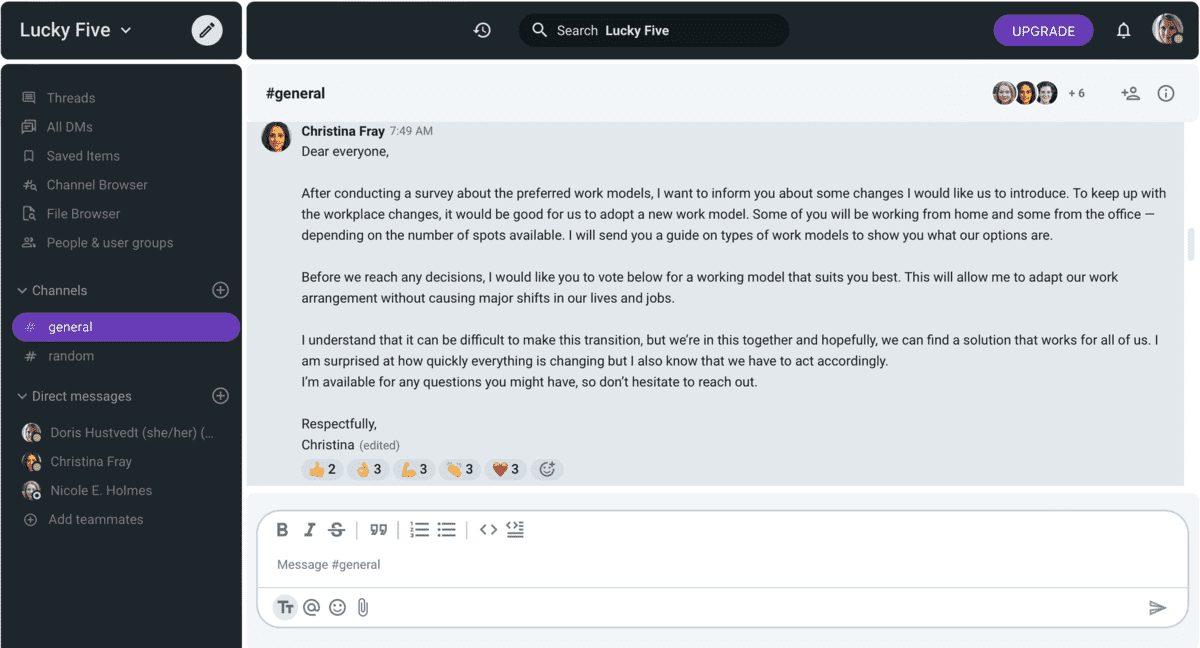
💡 Pumble Pro Tip
Christina communicated change quite effectively in the example above but, if you want to find out more about how you can communicate the upcoming changes to your coworkers or employees, read our guide:
Examples of people with high and low EQ in the workplace
If you’re still not sold on the idea of EQ being more important than IQ in the workplace, we prepared some examples for you, to further paint the picture of why emotional intelligence is crucial in the workplace.
Take a look at the table showing the differences between people with high and low EQ.
| 🔼 People with high EQ: | 🔽 People with low EQ: |
|---|---|
| Make better decisions and solve problems | Play the victim and avoid taking responsibility for their mistakes |
| Keep cool under pressure | Have passive or aggressive communication styles |
| Resolve conflicts | Refuse to work as a team |
| Listen, reflect, and respond to constructive criticism | Dismiss other people’s opinions |
| Have greater empathy | Are overly critical of others |
Now, let’s look at an example that illustrates the differences between high and low EQ.
Let’s say that Karen Wilson, a PR specialist in an IT company, has come up with an idea about the upcoming conference, and decided to share this idea with her manager, Katie Stark via Pumble, a team communication app.
Unfortunately, her manager, Katie Stark, has low emotional intelligence, which clearly shows in her scarce response below.
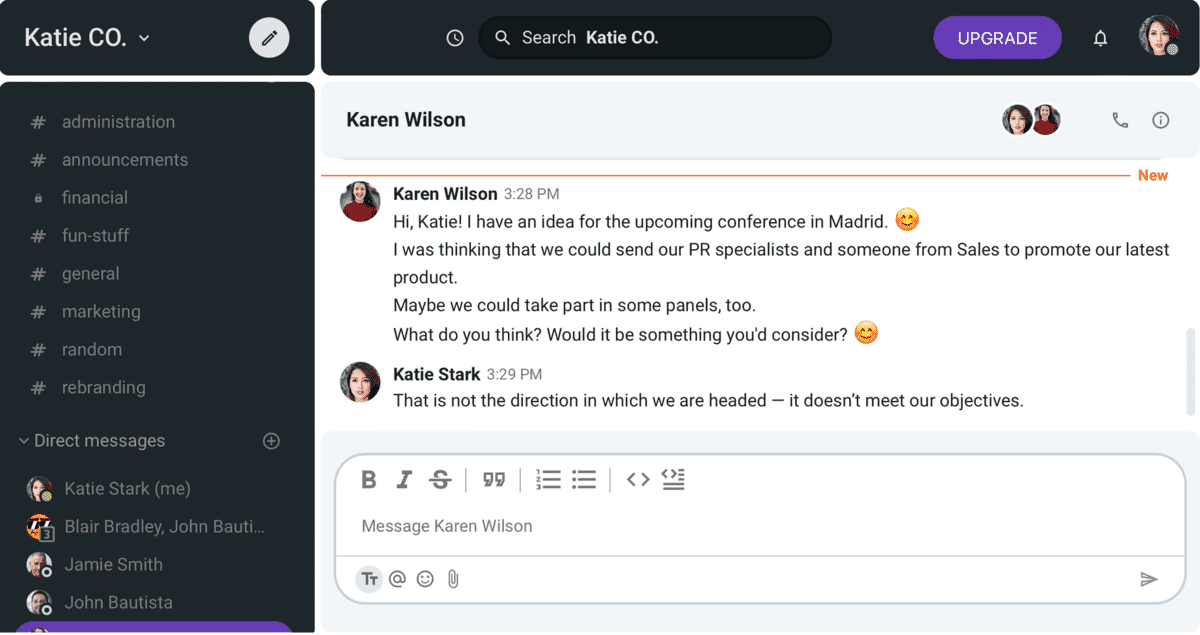
In this example, Katie is being too direct and not at all empathetic, which might cause Karen to shy away from offering ideas in the future.
But, what would happen if Katie was highly emotionally intelligent? Let’s take a look at how her response would look like in that case.
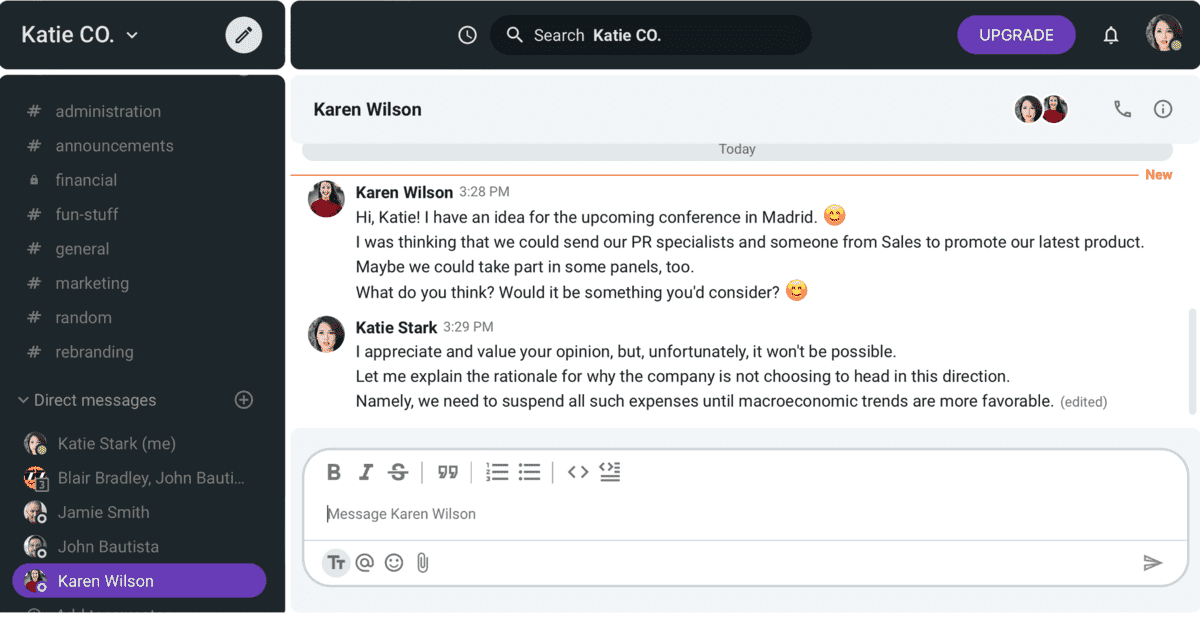
In this case, Katie has explained to her coworker why the idea she suggested is not feasible at the moment.
Because of that, Karen is more likely to feel seen, heard, and understood — even though her idea is rejected, Karen still feels like there’s space for her and her ideas in the company.
Improve your EQ with Pumble
Your success in business (as well as in life in general) depends more on your EQ than your IQ.
Luckily for all of us, we can improve EQ at work and soar to new professional heights.
Even though improving emotional intelligence in a remote setting may be challenging, an effective team communication app, such as Pumble, can help with that.
To raise your self-awareness, as one of the emotional intelligence components, you can ask for your manager’s feedback via Pumble and schedule a one-on-one video or voice call.
This way, you can identify your strengths, weaknesses, and areas for improvement, which is critical for your personal and professional growth.
Furthermore, you can take advantage of high-quality group video calls to improve your social skills, including active listening and nonverbal communication.

